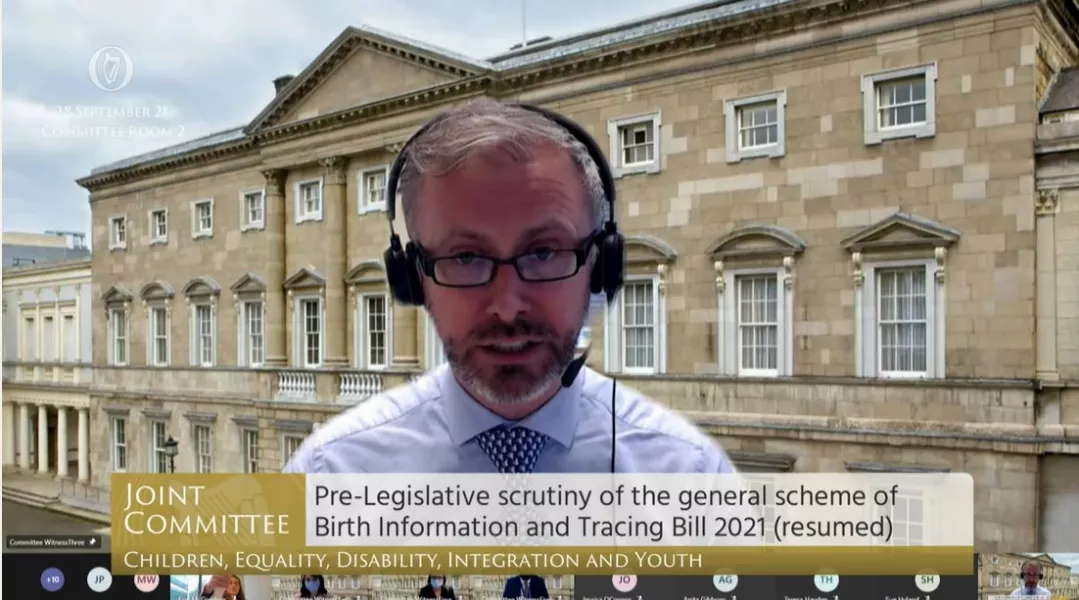Failure to balance the privacy rights of mothers with the identity rights of children risks forthcoming adoption and tracing legislation being found “unconstitutional”, a Dáil committee has heard.
Minister for Children Roderic O’Gorman has defended measures in the Birth Information and Tracing Bill, that will require “information sessions” to be held prior to the release of birth records, in cases where parents have requested not to be contacted by their adopted child.
In the past, witnesses have expressed concerns to the Oireachtas Children’s Committee that such measures were unnecessary and would stifle the release of records.

Mr O’Gorman said: “I have heard it expressed before the Committee that the information session is not required and that it hampers release.
“This simply does not reflect the position. The legislation aims to provide a clear legal basis for the full release of the birth certificate and birth information in all cases.
“To achieve this, the legislation must contain a mechanism to balance the constitutional privacy rights of mothers with the constitutional identity rights of children.
“Failure to include this balance risks the legislation being found unconstitutional.”
Information sessions
The mechanism would include three elements: that a person requesting records is at least 16 years old, that an information session is held in cases where parents have requested ‘no contact’, and that counselling and support services are made available for mothers and adopted persons who seek it.
Information sessions would see a suitable person appointed to inform adoptees in cases where their parents have requested not to be contacted.
That person “can provide sensitivity, compassion and context and point the person towards available supports”, the Minister said.
Previous attempts to legislate were severely criticised for processes that were more adversarial
Mr O’Gorman told the committee on Tuesday that all records will be released following information sessions, even in cases where a mother has “registered an opposition to the release of her name”.
He added: “Previous attempts to legislate were severely criticised for processes that were more adversarial, that were viewed as pitting a mother and an adopted person against each other and not offering a guarantee of released information in every case.
“This information session is non-adversarial, it is a simple, minimal measure that recognises the challenges, complexities and sensitivities for those impacted by adoption.
“This is the intention of the information session.”
Human dimension
Mr O’Gorman said he had listened to the concerns raised, and is considering amendments that would enable the information sessions to be held virtually, without the requirement for a social worker, and to ensure it will be “as sensitive and user-friendly as possible”.
He said that most mothers will be happy for the information to be released, meaning in many cases information sessions will not be needed.
But he said there was a cohort who may have experienced crisis pregnancies and had little or no choices or support.
“They may have lived with this all their lives and may not have told anyone. There is a very human dimension to this that goes to the very core of this debate about balancing of rights,” he said.
“That particular group of mothers has lived with pain, hurt and fear.
“As legislators we cannot ignore their rights.”
Groups pointed out that it’s condescending and paternalistic and lots of other things
Social Democrats TD Holly Cairns questioned the need for the information sessions, and the basis for which the Minister said the legislation could be found unconstitutional without them.
She said: “The compulsory information session was highlighted by so many witnesses as a serious issue.
“Groups pointed out that it’s condescending and paternalistic and lots of other things.
“I know you’re claiming this is kind of a fair and compassionate way to communicate with an applicant, but now, today, saying that without it, it’s unconstitutional.
“I’m wondering what is the basis of that assertion that it’s unconstitutional? Was that information provided by the Attorney General?”
Mr O’Gorman replied: “There is a constitutional right to privacy recognised in Irish law. There is also a constitutional right to identity information.
Our legislation has to find a way of balancing that
“In a circumstance where a parent or a mother doesn’t wish for the fact that they gave a child up for adoption to be known, their right to privacy is conflicting with the identity rights of the adopted person.
“Our legislation has to find a way of balancing that.”
He added: “The Constitution and the courts allow the Oireachtas to balance rights, but it has to be seen in the legislation that both sets of rights have been taken into consideration.
“That’s why we see the meeting as really important, because it at all times guarantees the provision of full access to the information for the adopted person.
“But it does ensure that the privacy rights of, for example the mother, is present in this process, through the fact that the mother has requested no contact, and that being conveyed to the adopted person.”







